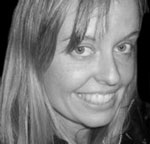
When you get six of Africa's most outspoken artists and activists around a table for a discussion, you can be sure of entertaining results. This certainly proved true at Wednesday's Open Forum session, titled "A New Generation of African Artists and Activists Talk Politics", even if it also revealed fairly deep fractures within ideas relating to African languages and identity.
In the hot-seats were two writers, two musical artists, a publisher, and - perhaps a little incongruously - Google's policy manager for sub-Saharan Africa, Ory Okolloh. The literary representatives, Binyavanga Wainaina and Petina Gappah, were always unlikely to see totally eye-to-eye.
Kenya's Wainaina is a well-known iconoclast, famed for a satirical 2005 essay in Granta entitled How to Write About Africa, which tore into the stereotyped Western tropes of the continent: "Never have a picture of a well-adjusted African on the cover of your book, or in it, unless that African has won the Nobel Prize. An AK-47, prominent ribs, naked breasts: use these."
...Zimbabwe's Petina Gappah, on the other hand, is the darling of the establishment. Her first book, An Elegy for Easterly (2009), won The Guardian First Book Award and was shortlisted for other prestigious accolades. The Guardian has described her as "in control of what promises to be a significant literary career".
On the music side, Nigeria's Femi Kuti, once termed "the most popular African musician of his generation" - though he has never quite achieved the iconic status of his father, Fela - shared the stage with South Africa's Simphiwe Dana. Aside from her soulful music in her own language, Xhosa, Dana's high-profile Twitter spats with Helen Zille have been news recently. But she has also become something of a language-rights advocate, having made a submission to Parliament on the importance of pupils receiving education in their home languages.
...Wainaina stuck to his guns in his view that mainstream fiction emanating from the continent these days is playing it too safe. "Late capitalism gives us well-behaved stories, but they lack a certain urgency." Petina Gappah clearly suspected some of his criticism was directed at her, and pre-empted it by saying: "I've won a prize, so maybe I should give it back". It was Gappah who climbed straight into one of the primary divides of the panel, however, by referencing the interview she gave to the Guardian in 2009 in which she said that she rejected the term "African writer".
In the 2009 interview, she explained that her publisher had originally touted her as being "the voice of Zimbabwe", before she insisted that this claim be excised from publicity material. She told the Guardian: "It's very troubling to me because writing of a place is not the same as writing for a place... I get irritated by the term 'African writer' because it doesn't mean anything to me. Africa is so big. There are some people who are happy to be African writers. They are pan-Africanists. I'm not a pan-Africanist. I think African countries have a lot in common. But we are also very different."
It was predictable that this view might be unpopular at Open Forum, given the distinctly pan-African ideology that has characterised proceedings thus far. But Gappah wasn't backing down: "I am tired of that conversation," she told the panel. "Yes, I am proud to be African, but I want to be treated as an individual."
...This preoccupation with an "authentic" African identity had an interesting counterpoint from a speaker at another session earlier in the day, the UN Development Programmes's Brian Kagoro, who gave a barnstorming presentation on a panel that included ex-Mozambican president Joaquin Chicano and Dr Mamphela Ramphele.
...Ultimately, the question of what constituted an "African identity" went unanswered. "To be African is to inhabit a set of contradictions," said Gappah at one point. But as one social media commentator had it, isn't that what it means to be human?
Read the full story on www.dailymaverick.co.za.
Daily Maverick is a unique blend of news, information, analysis and opinion delivered from our newsrooms in Cape Town and Johannesburg, South Africa. There are many ways to describe exactly what we do (and for the price of a cup of coffee we’re capable of talking your ears off about it), but the best way to understand the end result is to experience it. Every part of Daily Maverick is free-to-air and no payment is required, although free registration is required for a small subset of functions and pages.
Daily Maverick is run by an independently owned, private company with no affiliation to any other media group (or political party or religious organisation.) Follow Daily Maverick on Twitter at @dailymaverick.
Go to: https://www.dailymaverick.co.za/